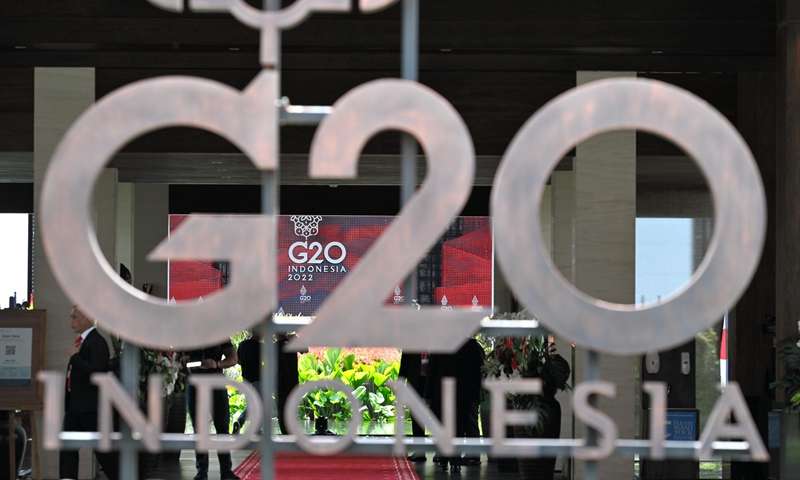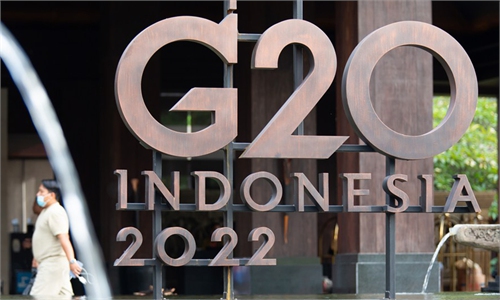G20 concludes striving to seek common ground, push cooperation
Declaration shows complex intl ties as West hypes irrelevant topic: observer

G20 Photo:VCG
The 2022 G20 Leaders' Summit concluded on Wednesday with member states issuing a joint declaration on cooperation for global development, and analysts said that China's proposals have received worldwide support and contributed wisdom for the turbulent world to deal with common challenges and crises.The document has highlighted consensuses on issues like food and energy security, climate change, the fight against the COVID-19 pandemic, digital economies and anti-corruption, with analysts saying the declaration reflects the common grounds shared by the international community and the responsibilities of the major economies amid the challenges affecting all countries around the globe.
On a sensitive issue like the Ukraine crisis, the joint declaration also reflected the differences among the member states, and experts said some Western countries led by the US are trying to hype the topic which is irrelevant to the economic cooperation at the G20 summit which aims at promoting cooperation between major economies worldwide to deal with common challenges. Western countries are trying to use a geopolitical crisis to further sabotage the unity of the international community, said the experts.
China's proposals
Development is the key for countries around the globe to deal with the common challenges, said analysts, and when Chinese President Xi Jinping called for collective action and close cooperation to make global development more inclusive, beneficial to all, and more resilient, many attendees to the G20 sessions showed their support.
Zheng Yongnian, a political scientist and organizer of the Strategy 20 International Conference, which brings together thinkers and strategists from G20 countries for dialogue, noted China's central role on the global economic stage.
"As the world's second-largest economy, China has the ability, willingness and experience to improve the world order, and it will also help the further growth of the world economy in the technical and economic fields," Zheng told the Global Times on Tuesday.
For instance, in the field of digital economy, China plays a unique role especially with its significant resources and influence. On Wednesday, the Chinese President said China stands ready to continue cooperating with the members of the G20 to jointly build a global digital economic paradigm featuring benefits for all, balance, coordination, inclusiveness, win-win cooperation and common prosperity.
When discussing the issue of digital transformation, Xi said an expanding digital economy and an accelerating global digital transformation have become important factors influencing a world economic paradigm.
Li Haidong, a professor from the Institute of International Relations at the China Foreign Affairs University, told the Global Times that China has unique advantages in many areas, including a huge market with potential and certainty, so it has an irreplaceable role to play in boosting global recovery, and this is why China's stance and strategy for the future have global significance, and it's impossible to exclude or isolate China from any international issues.
As the world is going through unprecedented difficulties unseen in many decades, Xi, in his speech at the first session of the 17th Group of 20 summit, called on countries, world's major economies in particular, to stand with each other in the face of risks and challenges, join hands together, and elevate win-win cooperation to a new height, the Xinhua News Agency reported.
The Chinese leader once again called for more global efforts to support and assist developing countries and ensure that the benefits be shared by all across the globe, saying, "Development is real only when all countries develop together."
On the sidelines of the G20 summit, Xi had meetings with many leaders from different countries, including France, Netherland, Spanish, Argentina, South Africa, South Korea, Senegal and Australia, and according to the media, some other countries' leaders, like the new UK Prime Minister Rishi Sunak, also wanted to schedule a meeting with Chinese President but failed to realize it.
Analysts said this shows that all parties involved - Western countries or developing countries from Asia, Africa and Latin America -- want to make their ties with China stable and to benefit from China's development, showing their strong confidence in China's economy and desire of exploring more possibilities for cooperation with China.
"These major economies worldwide are mainly key regional powers or major powers with global influence, and their attitude has reflected that they recognized China's global influence, and respect China's stance on core interests, and they want to keep boosting interconnectivity with China, rather than decoupling," said Li.
As Xi noted, to deepen cooperation among all countries is the only viable way to get through the difficult times, said Mohammed Saqib, an Indian economist and secretary-general of the India-China Economic and Cultural Council.
"China has set an example of collaboration and commitment with other countries amid the COVID-19 pandemic. I think this is when governments should follow suit and come forward for holistically enhanced all-around cooperation to pull out of this chaos," the Indian economist told Xinhua.
Agreements and differences
Although the G20 members reached consensus on many fields for cooperation and demonstrated great unity, many Western media highlighted text on the Ukraine crisis in the joint declaration of the G20 this year which reflected differences and disagreements.
The summit concluded Wednesday with a leaders' statement that "deplores in the strongest terms the aggression by the Russian Federation against Ukraine and demands its complete and unconditional withdrawal from the territory of Ukraine," CNN reported.
However, the document also stated that "There were other views and different assessments of the situation and sanctions," and the leaders recognized that the G20 is not a forum for solving security problems.
Chinese analysts said the part on the Russia-Ukraine conflict in the declaration looks very odd and reflects complicated international relations at the moment, because it openly shows disagreements which are not supposed to be showed in the document that reflected consensus.
declaration reflects complicated intl relations as West hypes irrelevant topics
Since the Russia-Ukraine conflict broke out in February, the international community has always showed different stances, with the West holding a hawkish stance against Russia, and many other non-Western countries like China, India, South Africa and Saudi Arabia being more neutral, with the consideration of the complicated historic reasons and the eastward expansion of NATO in Europe.
It seems like the US and some Western countries want to use the G20 declaration to maximize their hostile voice toward Russia, without considering the unity among the international community, and the declaration also stressed that the G20 is not a forum for security issue, this has reflected the opinions shared by more G20 members, experts noted.
Selcuk Colakoglu, director of the Ankara-based Turkish Center for Asia-Pacific Studies who also attended some G20 sessions, told the Global Times that "the Russia-Ukraine conflict has aggravated the difficulties of the world economy stemming from the pandemic. China has acted in a very balanced and responsible way by keeping global supply chains on track without further military escalations."
In this manner, the Global Development Initiative and Global Security Initiative proposed by Chinese President Xi are timely and necessary steps to handle global economic and security challenges properly, Colakoglu said.
Noting the root cause of the ongoing food and energy crises is not production or demand, but interrupted supply chains and international cooperation, Xi suggested that the global community enhance cooperation on market supervision and regulation, build partnerships on commodities, develop an open, stable and sustainable commodities market, and work together to unclog supply chains and stabilize market prices.
Li said when Western countries try to use their stance to replace the international consensus in some awkward way like putting controversial words into the declaration, China is making efforts with other partners to find solutions for urgent crises, and the rest of the world can see clearly who is more responsible and trustworthy amid the era of turbulence and uncertainty.



